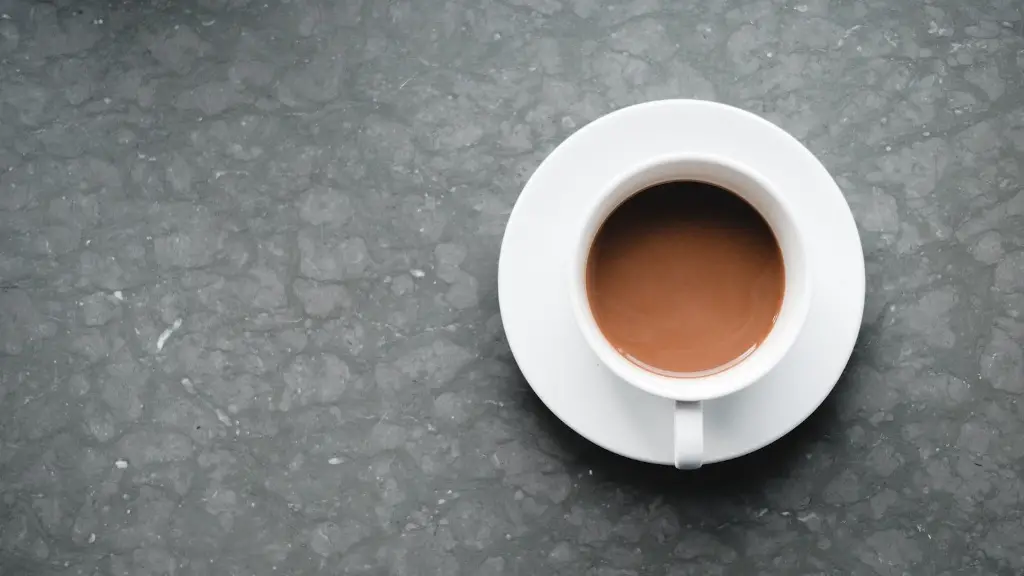Health and Coffee Drinking
Coffee drinking is a popular morning ritual and, for many, an integral part of their daily routine. However, the effect of drinking coffee on oral health remains controversial. Some experts say that coffee is safe to drink before brushing your teeth and will not necessarily damage the enamel. Others have reservations about the potential effects of coffee, particularly regarding its staining potential, and advise to avoid drinking it before brushing your teeth.
Coffee is a stimulant and contains tannins and caffeine, both of which can cause discoloration of your teeth if not adequately rinsed away. Coffee can also interfere with the effectiveness of fluoride toothpaste. Fluoride plays a key role in preventing tooth decay and strengthening teeth, and without it, drinking coffee before brushing can lead to a higher risk of cavities.
Furthermore, coffee’s acidic nature can also affect the enamel. This can create areas that are more prone to bacteria, leading to increased risk of cavities and tooth discoloration. Every cup of coffee has a slightly different acidity level, depending on its origin and the way it is brewed, which can again influence your oral health.
Although some studies suggest that drinking coffee may not damage your teeth, it is always best to err on the side of caution. If you prefer to drink coffee, drink it with food and rinse your mouth afterwards, or wait at least 30 minutes after having coffee before brushing. This gives the saliva a chance to neutralize the acids left by coffee. You may also want to consider switching to decaf coffee, since it contains less acid, and combining it with milk.
Dental Hygiene After Coffee
Dental hygiene is essential to keep your teeth healthy. Besides limiting your coffee intake and reducing the frequency of drinking it before brushing, it is also helpful to complement your oral hygiene habits with regular dental appointments. This can help you to prevent any possible damage and make sure you maintain a brilliant smile.
Seeing a dental hygienist at least once or twice a year is recommended by experts. They can diagnose and treat gum diseases such as gingivitis, an inflammation of the gums caused by bacteria. They can also apply a sealant to the enamel to protect from further damage caused by coffee and other beverages.
Risk of cavities can also be reduced by choosing toothpaste and mouthwash with fluoride. Fluoride helps to protect the enamel and helps to strengthen teeth. In addition, brushing at least twice a day and flossing regularly is paramount to remove plaque, the sticky film of bacteria formed on the tooth surface. This will disrupt its ability to perform its damaging foods and keep your mouth at its best health.
In addition, chewing sugar-free gum is a great way to reduce the risk of cavities. This is because it stimulates saliva production, which will help to rinse away the acid left by coffee.
Oral Care Alternatives
If you are looking for an alternative to drinking coffee before brushing your teeth, there are several other options available. Drinks like herbal, green, or black tea, or hot cocoa can replace coffee in your morning routine. All these beverages contain some amount of caffeine, but are slightly less acidic and less likely than coffee to cause damage to your teeth.
In addition, sparkling water and fresh juices are excellent alternatives to coffee in the morning. They are free of any acidic compounds, thus not likely to damage your enamel or increase the risk of cavities. Using a straw is also a great way to drink all these beverages as they can help minimize contact with your teeth.
Staying adequately hydrated is vital for good health, in particular oral health. Not only can doing so protect your teeth, but having plenty of fluids can also reduce plaque re-formation and prevent dry mouth, a condition in which the salivary gland does not produce enough saliva.
Nutrient-rich Food for Teeth Health
People can benefit from adding nutrient-rich foods to their diet to support their long term dental health. Dairy products, veggies, nuts and whole grains are some of the best sources of calcium and phosphorus, two minerals that play a crucial role in dental health.
Dairy products are an invaluable source of calcium, which helps to maintain the structure of your teeth and strengthens their enamel. On the other hand, phosphorus works in synergy with calcium to further strengthen your teeth and protect against cavities. Both of these minerals can be found in high amounts in products like yogurt, cheeses, milk, and fortified alternatives.
Foods like nuts, beans and whole grains are excellent sources of phosphorous. Phosphorous helps to restore the minerals in the enamel, making the teeth more resistant to bacteria and the development of cavities. Eating green leafy vegetables like kale or spinach is also beneficial for your teeth, as they contain all essential vitamins and minerals, including calcium, magnesium, iron and vitamins C and A.
The Role of Vitamins and Minerals
Your teeth rely on many vitamins and minerals to keep them at their best, including vitamin D, vitamin C, magnesium, iron and zinc. All are essential for a healthy mouth as they interact with each other to build strong teeth and gums and can help reduce bad breath and gum inflammation.
Vitamin D is important for optimum absorption of calcium. The best source of this vitamin is sunlight. Vitamin C is required to form collagen which helps to keep your teeth and gums strong. Citrus fruits, green leafy vegetables, and fortified alternatives are some of the best sources of Vitamin C.
Magnesium helps to strengthen teeth and gums and helps to create saliva, which helps to protect against cavities. Nuts, legumes, whole grains and green leafy veggies are great sources of magnesium. Iron plays an essential role in forming enamel, and can be found in red meat, legumes, spinach, and fortified foods.
Finally, zinc helps your organism to fight bacteria which can attack your teeth and gums. Good sources of zinc include oysters, beef, spinach, pumpkin seeds, and fortified foods. To ensure that your teeth and gums have optimum oral health, it is important to include all these vitamins and minerals in your diet.
Brushing Teeth Regularly
Although coffee is a delicious beverage, it can be damaging to tooth enamel. However, following some simple rules can help you reduce its negative impact. The most important one is to brush your teeth twice a day. Brush your teeth at least two minutes with a fluoride toothpaste, making sure to reach the inside, outside and top of the teeth. Rinse your mouth thoroughly with water afterwards.
In addition, use an antiseptic mouthwash to reduce the amount of bacteria in your mouth and limit the risk of plaque and cavities. Finally, visit your dentist regularly. This will not only help you maintain healthy teeth and gums, but also improve your overall health.





